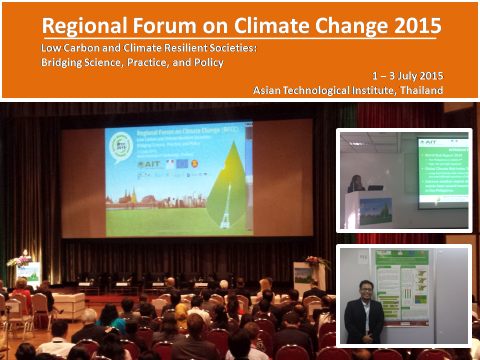OML Center at the RFCC 2015 – Low Carbon and Climate Resilient Societies: Bridging Science, Practice, and Policy

OMLC Executive Director participates in Regional Climate Projections Consortium and Data Facility
December 11, 2016
Car Floatation Device: A New Disaster Mitigation Innovation during Floods
December 11, 2016OML Center at the RFCC 2015 – Low Carbon and Climate Resilient Societies: Bridging Science, Practice, and Policy

By: AV Gabriel and JC Yokingco
Date posted: July 8, 2015
The OML Center presented and joined other members of the ASEAN scientific community and other relevant stakeholders in the Regional Forum on Climate Change (RFCC) – Low Carbon and Climate Resilient Societies: Bridging Science, Practice, and Policy held last July 1-3, 2015 at the Asian Institute of Technology (AIT), Bangkok, Thailand. The forum was hosted by AIT in collaboration with the French Ministry of Foreign Affairs and International Development, Association of Southeast Asian Nations (ASEAN), and the European Union (EU).
A poster on “Mapping of Appropriate Rice Cultivation Zones for Flood-affected Areas in Apalit, Pampanga using LiDAR and LISFLOOD-FP” was presented by Yokingco during the forum’s poster session. It presented the outputs of one of OML Center’s banner projects “Flood Inundation Modelling using LiDAR and GIS (FIMULG)”. The presentation emphasized the application of powerful technologies and techniques such as LiDAR and Flood modelling in aiding rice farmers to adapt to adverse climate phenomena such as flooding.
Aside from the poster presentation, Ana Veronica Gabriel presented in the session entitled “Mainstreaming Climate Change.” Gabriel gave a platform presentation on a study entitled “Linking Loss and Damage with Climate Change Adaptation (CCA) and Disaster Risk Reduction (DRR) in the Philippines.” The presentation was one of the study outputs of the Asia Pacific Network (APN)-funded project “Assessing the linkages between CCA, DRR, and L&D: Case studies on the low-lying coastal cities in Cambodia, Indonesia, Philippines, Thailand, and Vietnam” implemented by the Center. The initial findings on the current loss and damage assessment system of the Philippines as well as challenges and recommendations on the system in the context of CCA and DRR were presented.
Yokingco and Gabriel were among the 115 delegates that were granted financial support by the organizers to present and participate at the forum.
About RFCC 2015
The regional forum brought together over 400 participants coming from over 20 different countries. The participants were scientists, policymakers, practitioners, and members of Civil Society Organizations (CSOs), International Non-government Organizations (INGOs), foreign agencies, press, and media. The event programme was composed of plenary sessions, technical sessions, political sessions, media training, exhibition, poster sessions, and other side events. The sessions revolved around topics on climate science, climate and disaster, governance and policy, climate financing, and cross-cutting studies.
The Regional Forum aimed to enhance the channel of communication among the gamut of stakeholders, primarily among ASEAN countries. It also sought to propose interventions that would influence climate policy in the region, and inspire ASEAN position for climate change negotiations at the global scale. The Forum created a platform for engaging a variety of stakeholders from the ASEAN region in discussions on climate change related agenda in order to ease the translation of science into practice and policy. It also allowed negotiators, policy makers and high-level advisers from ASEAN to benefit from the results of contemporary scientific research to carve climate change-related policies in the long term, as well as to offer ASEAN negotiators a venue to build positions of increased ambition prior to the Conference of Parties 21 (COP 21).
Take-away Message
As Mukand Babel, Chair of the RFCC 2015 Organizing Committee, said during the Closing Session, “Climate change is a universal concern.” In the context of the forum, it was emphasized that those who are in the hard sciences and policy and decision making should work together to make adaptation and mitigation happen. It was also noted that adaptation and mitigation should not be treated separately. We must look beyond simple adaptation and seek for transformational adaptation making sure that we are not only adapted to the changing environment, but also better off than our previous state. In order for adaptation and mitigation to properly be mechanized in the face of changing climate all of us have a role and we all must perform it.
To view the poster, click here.
To view the platform presentation, click here.
To know more about the RFCC 2015, click here.
